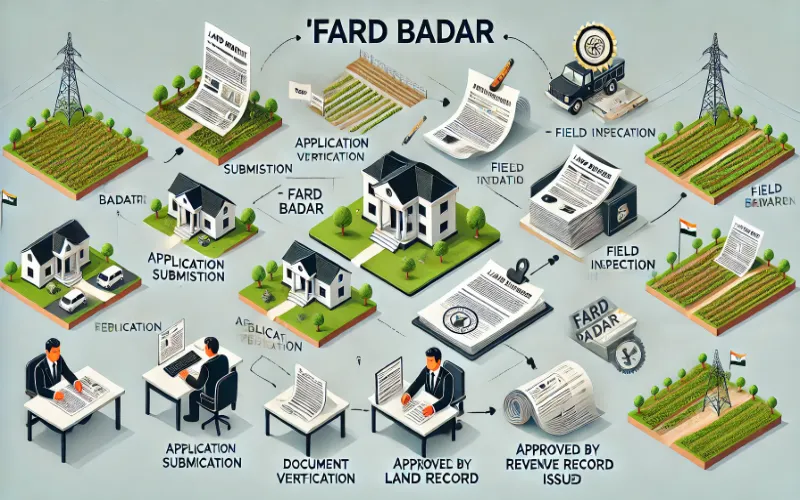In the world of land revenue and property documentation, precision is paramount. Official records must accurately reflect ownership details, land boundaries, and transactional history. Any discrepancy can lead to disputes, financial losses, or legal complications.
Fard Badar is a critical mechanism used to correct errors in land records, ensuring accuracy and transparency in revenue matters. It plays a pivotal role in property transactions, inheritance, and land mutation processes.
Understanding Fard in Revenue Records
The term Fard refers to an official land document that provides essential details about a property, including ownership, dimensions, and classification. It is often required when selling, transferring, or mortgaging land. These records are maintained by the Revenue Department and serve as legal proof of possession.
There are different types of Fard, such as:
- Fard Milkiyat – Ownership records.
- Fard Inteqal – Mutation records reflecting ownership changes.
- Fard Haq Shufa – Documents related to pre-emptive rights.
Since these records are crucial in property dealings, even minor inaccuracies can lead to complications, necessitating corrections through Fard Badar.
What is Fard Badar?
Fard Badar refers to the correction or modification of land revenue records to rectify errors or update ownership details. It is a legal procedure carried out by the revenue department to ensure that the official records accurately reflect reality.
Situations requiring Fard Badar include:
- Incorrect owner names due to clerical mistakes.
- Misrepresentation of land area or classification.
- Errors in mutation (Inteqal) processes.
- Discrepancies arising from inheritance claims or land disputes.
Unlike general mutation (Inteqal), which records ownership changes due to transactions, Fard Badar is specifically aimed at rectifying existing errors in land documents.
When and Why is Fard Badar Required?
Land records are the backbone of property rights, and any mistake in them can lead to legal or financial consequences. Fard Badar is necessary in cases such as:
- Clerical Errors: Spelling mistakes, incorrect survey numbers, or missing details.
- Inheritance Claims: When property records do not reflect rightful heirs.
- Land Sales & Transfers: To correct outdated ownership details before a transaction.
- Government Acquisitions: Ensuring the land record aligns with acquisition documents.
Without proper rectification through Fard Badar, landowners might face difficulties in selling their property, obtaining loans, or defending ownership rights in court.
Process of Obtaining Fard Badar
The Fard Badar process involves several steps, requiring legal documentation and approval from revenue officials. The general process includes:
- Application Submission: The landowner must apply to the local revenue office with a formal request for record correction.
- Document Verification: Supporting documents such as sale deeds, inheritance certificates, or court orders are examined.
- Field Inspection: Revenue officials may conduct a site visit to verify the claim.
- Approval & Record Update: Once verified, the changes are officially made in land records.
- Issuance of Updated Fard: The applicant receives a corrected copy of the land document.
The time taken for processing varies depending on the complexity of the correction and administrative workload.
Who Makes Fard Badar and Whose Permission is Needed?
The Fard Badar (Correction of Land Record) process is carried out by Revenue Officers within the local land administration system. It requires official approval and verification to ensure accuracy and legality in land record modifications.
Who Makes Fard Badar?
The preparation and correction of Fard Badar are managed by the Patwari, who is the lowest-level revenue official responsible for maintaining land records in rural areas. However, the process involves multiple revenue authorities, including:
- Patwari – Initiates and drafts the correction request in the revenue record.

- Tehsildar / Assistant Commissioner (AC) – Approves and verifies changes for legal authenticity.
- Revenue Clerk (Qanoongo) – Supervises record corrections at the tehsil level.
- Deputy Commissioner (DC) / District Collector – In some cases, higher-level approval is required for significant land corrections.
Whose Permission is Needed?
Approval depends on the nature of the correction. Generally, the following permissions are required:
- Patwari’s Initial Entry – The Patwari records the error and initiates the correction.
- Tehsildar / Assistant Commissioner Approval – Necessary for official changes to be legally recognized.
- Court Orders (if applicable) – If the correction involves ownership disputes, a court decree may be required.
- Deputy Commissioner (DC) Approval – For major land record modifications, inheritance claims, or disputed cases.
Without proper verification and approval, a Fard Badar request cannot be legally processed. The involvement of revenue officers ensures that land records remain authentic, preventing fraudulent changes.
Challenges and Common Issues in Fard Badar
Despite its necessity, Fard Badar is not always a straightforward process. Several challenges may arise, including:
- Bureaucratic Delays: Landowners often face long waiting periods due to slow processing.
- Corruption & Fraud: Unscrupulous individuals may attempt to manipulate records for illegal gains.
- Legal Disputes: If multiple parties claim ownership, resolving the matter can take months or years.

To avoid such issues, it is crucial for landowners to keep their property records updated and engage legal professionals if required.
Conclusion
Fard Badar is an essential process in revenue administration, ensuring that land records remain accurate and up to date. It plays a key role in preventing disputes, facilitating smooth property transactions, and upholding legal ownership rights. While challenges exist, a well-documented approach can simplify the correction process.
Landowners should regularly check their Fard records and initiate Fard Badar whenever discrepancies arise. Accurate land documentation not only protects individual property rights but also contributes to an efficient and transparent land revenue system.



Leave a Reply